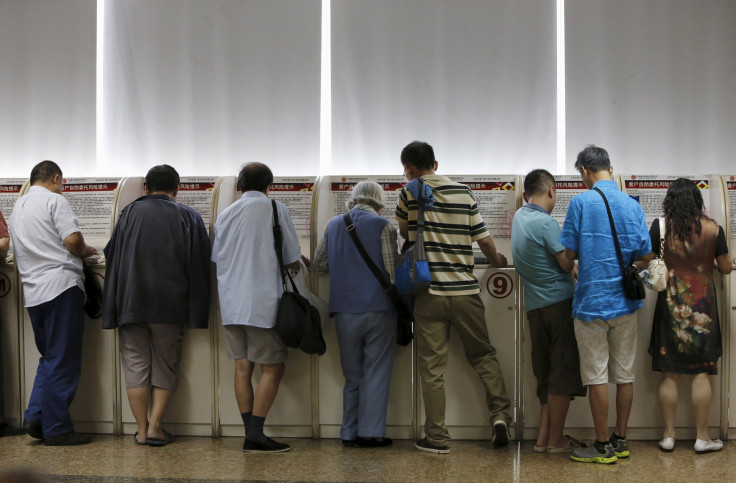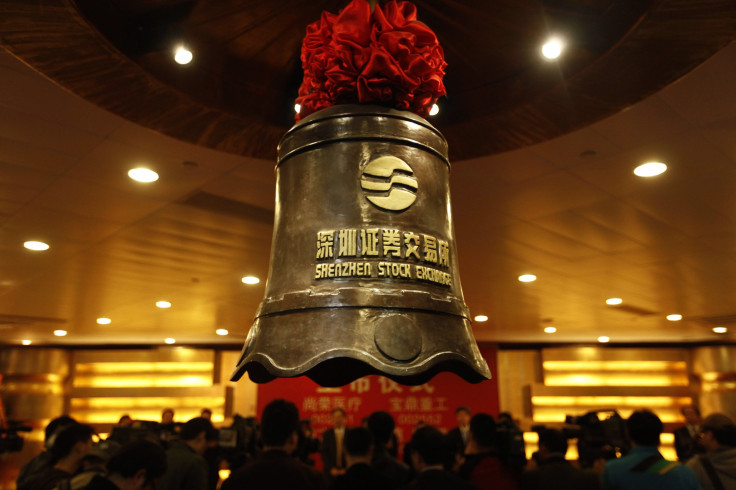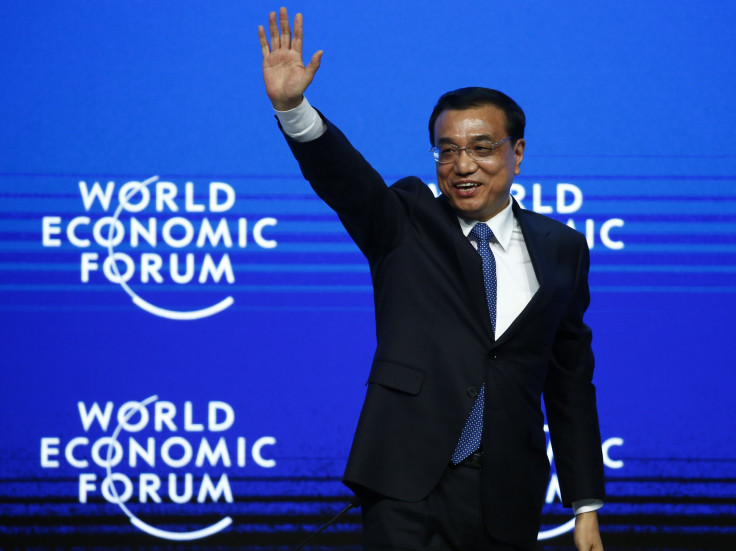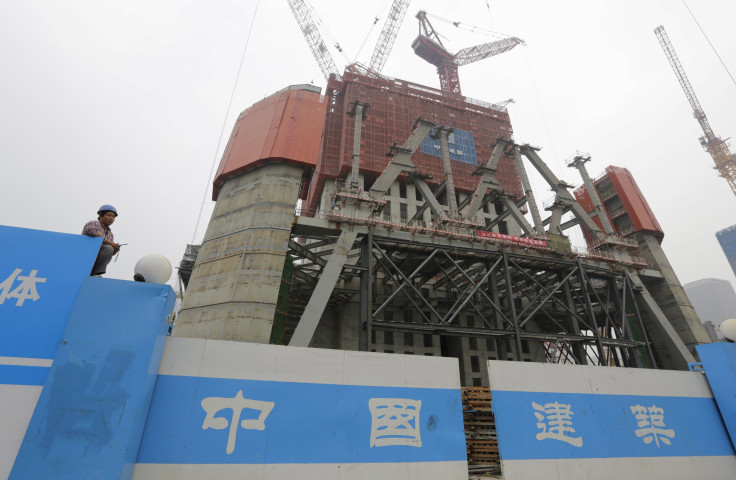Experts Warn Of Economic Challenges As Chinese Government Downplays Risk Of Stock Market Fall

SHANGHAI -- China’s stocks fell again Tuesday, but that didn’t stop the government from continuing to talk up the country’s economy.
A series of measures aimed at boosting the market, after three weeks of falls that wiped 30 percent off share prices, had produced a temporary rally on the main Shanghai Composite Index (SCI) on Monday -- but by Tuesday the market was falling again and the SCI closed around 1.3 percent lower, and shares on the secondary Shenzhen index and the Nasdaq-like ChiNext were down over 5 percent.
Yet headlines in many official media outlets on Tuesday focused not on the markets but on positive comments from China’s National Bureau of Statistics (NBS) that said the economy, which saw its slowest growth in six years in the first quarter of this year, was now “over the worst.”
"Positive changes are occurring due to government policies and reform measures," said the official China Daily.
NBS spokesman Sheng Laiyun emphasized a “warming real estate market” over the past two months, the potential for continuing growth in consumer spending, and the impact of a flow of private funds into infrastructure investment, through new “Public Private Partnerships.”
And Premier Li Keqiang echoed the positive tone, saying on Monday that “China has the confidence and ability to deal with risks and challenges to its economy.”
However other reports were less encouraging -- the official Global Times newspaper quoted several economists as saying that China’s growth for the second quarter was likely to be 6.9 percent, or even 6.8 percent -- below the first quarter figure of 7 percent, which was the lowest for six years. (And even the NSB admitted achieving 7 percent would be “arduous.”)

And with some Chinese media reports acknowledging that many investors were unconvinced by the recent measures taken to restore confidence in the market -- including a pledge-fund lending by brokerages, and persuading brokerages to promise to buy more shares and not to sell their holding until the market had rebounded by at least 20 percent -- concerns are growing about the impact of a prolonged slump in the stock market on China’s economy.
Experts say that tens of millions of ordinary citizens, many of whom have entered the stock market for the first time as it boomed over recent months, face losses -- and this could have a knock-on effect on consumption: “This is really a risk for the economy -- there are just so many retail investors in the market, and there are signs that it’s already hit the household balance sheet,” Zhou Hao, an analyst with ANZ Banking Corporation in Shanghai, told International Business Times.
Boosting the consumer economy, and encouraging a gradual rebound of real estate markets, which have slumped in the past couple of years following market-cooling measures, have been key planks of the government’s economic policy this year. On Tuesday, the front page of Shanghai’s most popular evening newspaper completely ignored the slowdown in the stock markets -- and instead emphasized the tentative rebound in the property market.
But Andy Xie, an independent Shanghai-based economist, who was formerly the Chief Asia Pacific Economist with Morgan Stanley, said the rise in the real estate market is directly linked to the stock market, which rose by more than 60 percent in the first five months of this year, before its recent falls:
“The government’s idea in trying to get the stock market going over the past year was that the economy was struggling, because the property market was coming down,” he told IBTimes. “So they hoped this would reverse the sentiment, because people would buy more properties based on paper profits. And it’s happened -- especially in Shenzhen.” (Shenzhen is close to the Hong Kong border, which has seen the fastest rise in property prices this year)
A falling stock market, on the other hand, could halt the property rebound in its tracks, Xie suggests. And like a number of other analysts, he says China’s banking sector is also exposed to the risk of contagion from the stock market fall: much of the recent boom in stocks has been based on an official relaxation of rules last year, which allowed investors to borrow money to invest in the markets, not just from brokerages -- in what’s known as margin trading -- but also from banks, via “trust products.”
“You have this sub-prime type of situation,” Xie said, “where the financing for the margin trading comes from both brokers, and from bank’s dedicated trust products.” What’s more, he added, China’s “shadow banking system,” based increasingly on online ‘P2P’ (peer-to-peer) lending also holds a large percentage -- up to 30 percent -- of the loans to stock market investors.
Such risk will add to difficulties for banks, which “already have a huge problem from bad loans to the property market,” Xie said. But he added that despite these problems, China’s “real economy,” though “flat,” remains relatively stable.
“The property market is already down, people still have jobs -- in fact the labor force is shrinking -- and exports are still stable in my view, and big infrastructure projects are still stable,” he said, “so the real economy is not going to crash.”
What would be dangerous, however, Xie warned, would be if the authorities continued trying to prop up the markets -- for example to help out some of China’s well-connected private investors, running private funds worth “200-300 million yuan” ($35-50 million), who he said had overexposed themselves to risky borrowing in recent months.

“If the central bank prints money to buy stocks -- and that’s not inconceivable, because some of these people, who’ve got stuck in the market are often very powerful and can influence government -- then we might see a massive capital outflow, which would affect the currency.”
In the end, however, Xie said the government is likely to stop trying to prop up the market, and pull back, “after a few trials -- as it did in 2008,” after China’s last stock market crash. And he suggested that some official talk of propping up the market may be designed to let investors down gradually: “They have to make people who lose out feel better,” he said. “The rhetoric is often for that purpose.”
Others analysts agree with Xie’s conclusion that the lesson of recent events is that the “financial markets should not be allowed to hold the real economy hostage.”
“The government… should let the market find the right price and should not introduce measures to artificially prop the markets up,” Louis Tse, a director of VC Brokerage, told Hong Kong’s South China Morning Post.
Andy Xie suggested that the “right price” for China’s main Shanghai Composite Index is around 2,500, or just 25 percent higher than where it was a year ago, when it started its heady 12-month rise. And he said China’s high-tech ChiNext ought to be allowed to fall significantly further: “At its peak, it was trading at 130 times earnings, now it’s fallen to 70 seventy times earning,” he said, “but a normal level would be 20 times earnings!”
That could hit some of the government’s attempts to raise funds to promote the innovative small companies it hopes will be an engine of economic growth.
And some experts worry more that the current turmoil might lead the government to slow down market-based reforms, which would include “switching from an approval-based to a registration-based IPO system,” the China Daily reported.
However, Xie said ordinary investors can weather the storm: “It won’t affect average people that much. On average they’ve only invested 10,000 RMB (about $1,600) -- so it’s not going to break them.”
And Zhou Hao of ANZ Bank in Shanghai said it would be healthier in the long run if some ordinary retail investors exit the market, after becoming aware of the risks in investing -- rather than “the government consistently helping the market -- and then one day they’ll have a bigger loss because they believe there’s no risk.”
Yet some ordinary investors are still clinging to the hope that the authorities may save them -- something Chinese investors long believed, until the crash of 2007-2008. And some of the mainly young investors who poured into the market in recent months may not remember those days.
At his newspaper stall on a leafy side street in central Shanghai, Zhang, a vendor, (who didn’t want to give his full name) was watching the stock market figures on his laptop on Tuesday afternoon. He’d been “playing the market” for a few years, he said, but he’d missed the chance to sell off last month when the market was high -- so now he was holding on to his shares.
“We earned a lot earlier in the year -- and now we’ve lost quite a lot,” he said. “But we we’re waiting for them to “save the market” -- we trust the Communist Party,” he added with a grin.
For China’s leaders, this may present a challenge. With a new generation of Internet-savvy investors facing their first harsh lesson about the potential risks of investing in the stock market, some may start to question why the leadership allowed officials and state-run media to issue a series of statements emphasizing the important of bringing funds into the stock market over the past six months.

On Tuesday the official Global Times newspaper addressed this issue, insisting that the market fall “could happen to any country in the world.” And it said any country “would react in the same way as the Chinese government has.” It said Chinese stock markets have “a large reserve of resilience,” and stabilizing measures would gradually take effect, and the Chinese public “can be more relaxed and confident,” since “besides the tumbling stock market, all other financial systems in China are functioning well… No-one believes that the country's economy is on the verge of a crisis because of the market fluctuation.”
Analysts will be watching to see whether such comments are enough to reassure ordinary Chinese investors in the coming weeks.
© Copyright IBTimes 2024. All rights reserved.






















